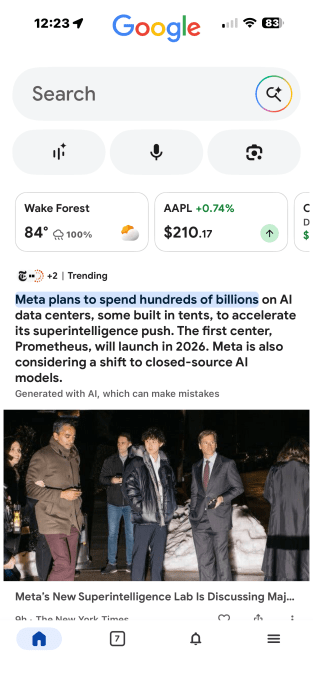Google's search app is undergoing a significant transformation, as the tech giant starts incorporating AI-generated summaries within its Discover feature. These summaries, which will appear alongside multiple news publisher logos in the top-left corner of the app, are designed to provide users with a quick overview of the latest news stories without the need to click through to the original articles. However, the app does caution users that these AI-generated summaries "can make mistakes."


While the AI-powered summaries are not yet available for all news stories, TechCrunch was able to test the feature on both iOS and Android devices in the United States. A Google spokesperson confirmed that this is not a test but an official U.S. launch, focusing on trending lifestyle topics such as sports and entertainment. The feature aims to help users decide which pages they want to visit more easily.
In addition to AI-generated summaries, Google has been experimenting with other ways to present news in Discover. Some stories will include a set of bullet points below the headline or be grouped with similar news items. For example, a story about President Trump's Ukraine deal also included links to other stories about Trump's latest actions, while a story from The Washington Post about ICE was followed by bullet points summarizing the story's content.
This update comes as many publishers have been experimenting with AI on their own sites, including The Wall Street Journal, Yahoo, Bloomberg, USA Today, and others. Startups like Particle, a news reader that uses AI to summarize stories and allow users to see different perspectives or ask follow-up questions, have also joined the trend.
However, there is significant concern in the publishing industry about how the shift to AI is impacting website traffic and referrals. Features like Google's AI Overviews and AI Mode allow users to get answers to their search queries without visiting a website directly, as the information can be summarized automatically or shared in a chatbot-style interface. This trend is also seen in other AI apps like ChatGPT or Perplexity.
In an attempt to appease publishers, Google recently launched Offerwall, a feature that allows publishers to generate revenue beyond traffic-dependent options like ads. With Offerwall, publishers who use Google Ad Manager can try out different methods to provide access to their content, such as micropayments or having users take surveys, sign up for newsletters, watch ads, and more.
However, for many publishers, these tools are coming too late, as traffic is already in a steep decline. A story by The Economist noted that worldwide search traffic fell by 15% year-over-year as of June, citing data from market intelligence company Similarweb. The number of news searches on the web that result in no click-throughs to news websites grew from 56% in May 2024, when AI Overviews launched, to nearly 69% as of May 2025. Organic traffic also declined, dropping from over 2.3 billion visits at its peak in mid-2024 to fewer than 1.7 billion.
Amid this shift, Google Discover remained a source for clicks, even as traffic from Google Search declined. However, this may no longer be the case if the AI summaries roll out more broadly within the Google app.